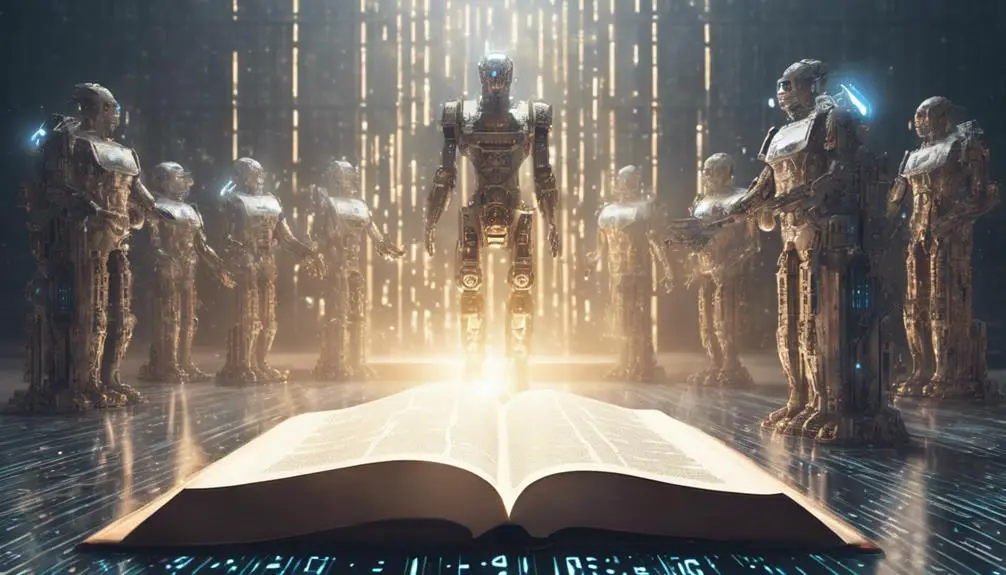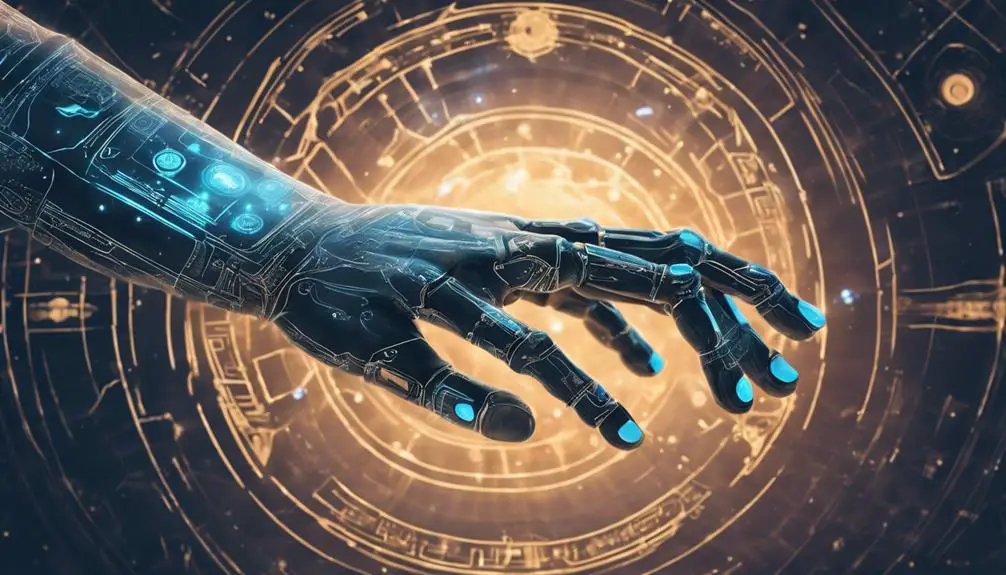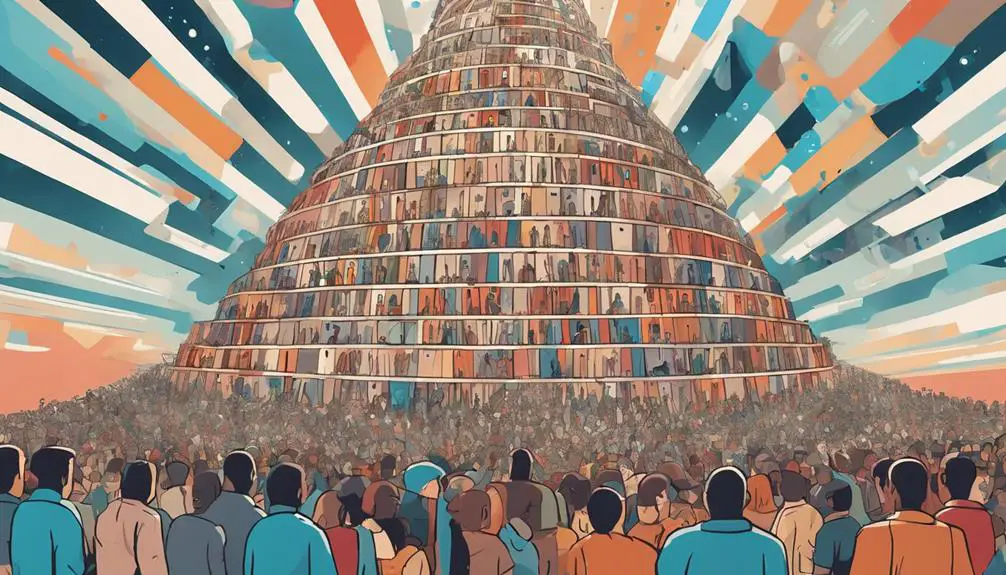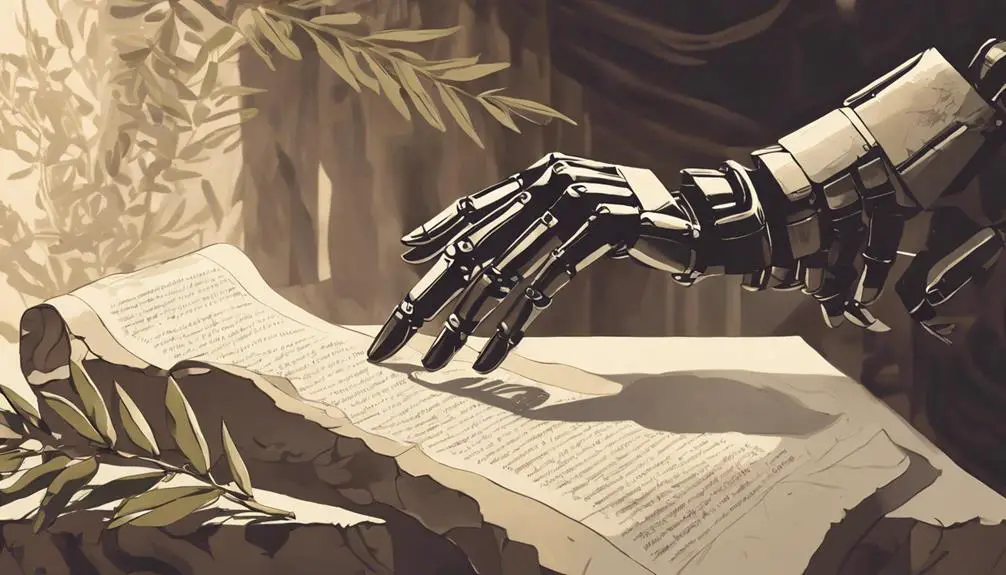Navigating AI in the Bible unveils a complex interplay of ancient wisdom and modern dilemmas, inviting a deeper exploration into the unknown.

Is Artificial Intelligence Mentioned in the Bible
Navigating the topic of artificial intelligence in the Bible is like embarking on a journey through a dense, untamed forest—you know there's something fascinating awaiting you, but the path isn't immediately clear.
You've probably wondered if the ancient texts, rich with symbolic imagery and prophetic visions, make any allusions to modern technological wonders. Consider the Tower of Babel as a metaphor for humanity's reach toward god-like creation or wisdom literature that eerily echoes our current debates on machine intelligence.
Let's explore together how these ancient scriptures might offer insight into today's ethical quandaries surrounding AI, leaving you with food for thought on where the line between divine wisdom and human invention blurs.
Key Takeaways
- The Bible does not specifically mention artificial intelligence or modern technologies.
- Biblical prophecies and symbolism focus on moral, spiritual, and cosmic forces rather than technological advancements.
- Wisdom literature and ethical teachings in the Bible offer guidance on navigating the ethical implications of AI.
- Themes in the Bible emphasize the importance of balancing technological progress with moral responsibility and respect for free will.
Understanding Biblical Symbolism

To grasp the concept of artificial intelligence in a biblical context, it's essential to first understand the symbolism pervasive throughout the scripture. The Bible is replete with symbolic creatures and apocalyptic visions that often carry deeper meanings beyond their literal interpretation. These symbols serve as metaphors for moral, spiritual, and existential concepts, providing the foundation upon which any discussion about the presence of artificial intelligence in the Bible should be built.
For instance, symbolic creatures such as the beasts in the Book of Daniel or the Book of Revelation aren't mere animals but represent empires, ideologies, or cosmic forces. Similarly, apocalyptic visions, rich in imagery and symbolism, depict the ultimate battle between good and evil, often portraying complex ideas about divine judgment, salvation, and the end of the world.
Understanding these symbols is crucial. They aren't direct references to technology or artificial intelligence as understood today. Instead, they convey messages about human nature, divine providence, and the moral fabric of society. Analyzing these symbols requires a scholarly approach that appreciates the depth and breadth of biblical literature, setting the stage for any subsequent exploration of artificial intelligence within this ancient text.
Prophecies and Technological Interpretations

Having established the importance of symbolism in the Bible, we now explore how prophecies may hold interpretations relevant to modern technological concepts, including artificial intelligence. Scholars and theologians often delve into the rich tapestry of biblical prophecies, seeking understanding and modern parallels. The apocalyptic visions found in texts like the Book of Revelation or Daniel's prophecies have been particularly scrutinized for their potential technological interpretations.
The imagery of these prophecies—vast, intricate, and sometimes bewildering—lends itself to a multitude of interpretations. As you delve deeper, it's clear that the symbolic language used could metaphorically speak to the rapid advancement of technology and its integration into human life. For instance, the concept of a globally interconnected society, once a fantastical notion, mirrors today's digital age, where artificial intelligence plays a pivotal role in shaping communication, security, and even our understanding of consciousness.
In analyzing these texts, it's essential to approach them with an objective lens, recognizing that while the Bible doesn't explicitly mention modern technology, the themes of knowledge, power, and the ethical implications of humanity's reach could indeed mirror the challenges and questions artificial intelligence raises today.
The Tower of Babel: An Early AI Analogy?

The Tower of Babel story, often interpreted as a cautionary tale about human ambition and communication, may also serve as an early analogy for the complexities and ethical dilemmas associated with artificial intelligence. This narrative illustrates the potential consequences of unchecked ambition and the inherent risks in striving to surpass our natural limitations, themes that resonate deeply with the ongoing development of AI.
Consider the parallels:
- Human ambition: Just as the builders of Babel sought to make a name for themselves, we push the boundaries of AI, aiming to achieve what was once considered divine or unreachable.
- Unified purpose: The unified effort to build the tower mirrors our global race towards AI supremacy, disregarding the potential fallout.
- Language diversity: The confusion of languages as a divine intervention to disrupt their plans highlights the importance of communication and understanding in our AI endeavors. Miscommunication and misunderstanding in AI development can lead to unforeseen consequences.
- Divine intervention: Reflects the need for ethical oversight and regulation in AI development to prevent harm and ensure the technology benefits humanity as a whole.
This story, then, not only warns of the dangers of human overreach but also emphasizes the need for careful consideration of the ethical implications of our advancements in artificial intelligence.
Wisdom Literature and Machine Intelligence

Wisdom literature, with its rich insights on human nature and morality, offers a unique lens through which to examine the ethical dimensions of machine intelligence. As you delve into texts filled with proverbs, reflections, and teachings, you're confronted with the recurrent themes of divine knowledge versus human limitations. This contrast becomes particularly poignant in the context of machine intelligence, where the capabilities of artificial systems to process and analyze information far exceed those of individual humans, yet fall short of achieving true wisdom.
The wisdom literature implicitly warns against the hubris of overestimating human intellect and by extension, the creations of human intellect, such as artificial intelligence. It suggests that while humans can construct complex systems, the understanding and ethical application of this knowledge remain firmly within the realm of divine insight. This perspective encourages a humble approach to the development and deployment of machine intelligence, recognizing its potential to augment human capabilities without losing sight of the inherent limitations and ethical complexities involved.
In essence, wisdom literature challenges you to ponder the moral implications of artificial intelligence, urging a balance between leveraging technological advancements and acknowledging the profound gap between human and divine knowledge.
Ethical Considerations in Scriptural Contexts

Reflecting on the ethical warnings from wisdom literature, we now explore how scriptural contexts across various traditions address the moral considerations surrounding artificial intelligence.
When considering the development and deployment of artificial intelligence, it's crucial to align with divine morality and respect free will, two principles often emphasized in sacred texts. The ethical concerns can be categorized as follows:
- Accountability: Who bears the moral responsibility for the actions of AI? This question challenges us to rethink our understanding of stewardship and divine morality.
- Autonomy: The extent to which AI should be granted autonomy intersects with discussions on free will, a gift bestowed to humanity, suggesting limits to how AI should be developed.
- Justice: Ensuring AI adheres to principles of fairness invokes the scriptural emphasis on justice, requiring that we imbue AI systems with the ability to uphold divine morality.
- Compassion: The importance of compassion, a central theme in many religious texts, raises concerns about the capacity of AI to truly understand and embody this virtue.
These considerations invite a deeper reflection on how technological advancements align with the ethical frameworks provided by spiritual teachings, ensuring that as we progress, we don't stray from the path of righteousness and respect for free will.
Frequently Asked Questions
How Do Modern AI Developers View the Ethical Teachings of the Bible in the Context of Designing Artificial Intelligence?
As you delve into how AI developers integrate ethical teachings into AI design, it's clear they're wrestling with aligning ethical algorithms with developer responsibility.
Many view these ethical frameworks as essential, guiding the creation of technology that respects human dignity and rights. This approach includes considering consequences and ensuring AI benefits society.
Thus, while not explicitly biblical, the moral compass guiding AI development often mirrors core ethical values found in various philosophical and religious teachings.
Are There Any Direct References or Allusions to Artificial Intelligence or Robotics in the Original Languages of the Bible, Such as Hebrew, Greek, or Aramaic?
You're exploring whether the Bible, in its original languages like Hebrew, Greek, or Aramaic, contains direct references or hints at artificial intelligence or robotics.
There aren't explicit mentions, but scholars delve into ancient metaphors and prophetic interpretations to find connections.
This analytical approach requires examining texts for underlying themes that could parallel AI concepts, even if the technology was beyond the ancient world's imagination.
It's a scholarly endeavor, blending historical context with futuristic speculation.
How Do Different Religious Denominations Interpret the Relevance of Biblical Teachings to the Development and Use of Artificial Intelligence?
Different religious denominations interpret the relevance of biblical teachings to AI development and use by analyzing historical interpretations and considering cultural impacts.
You'll find that some view AI as a tool for enhancing human capabilities, aligning with stewardship and innovation values.
Others caution against potential ethical pitfalls, referencing teachings on idolatry and the sanctity of human life.
This scholarly analysis reveals a spectrum of beliefs influenced by doctrinal differences and societal contexts.
Can the Concept of Artificial Intelligence Be Reconciled With the Biblical View of the Soul and Consciousness?
You're navigating a complex issue, wondering if the concept of artificial intelligence aligns with the biblical perspective on the soul and consciousness. This involves delving into machine ethics and the consciousness debate.
Analytically, it's crucial to examine how AI's decision-making processes and potential for 'consciousness' fit within religious teachings about the human soul.
Objectively, it's about finding where technological advancement intersects or diverges from spiritual beliefs on consciousness.
What Role Do Contemporary Theologians and Religious Scholars Play in the Discourse on Artificial Intelligence and Its Implications for Society?
You'll find that contemporary theologians and religious scholars are deeply involved in discussions about artificial intelligence and its societal implications. They're not just bystanders; they actively contribute to the discourse through the lenses of theological ethics and religious futurism.
Their insights help navigate the ethical dilemmas AI presents, blending ancient wisdom with modern technological challenges. Their role is crucial in examining how AI aligns or conflicts with humanity's moral and spiritual values.
Conclusion
In conclusion, while the Bible doesn't explicitly mention artificial intelligence, its narratives, symbolism, and ethical teachings offer a fertile ground for analogical interpretations.
The Tower of Babel's story, for instance, can be seen as an early metaphor for humanity's ambition in AI development, challenging divine boundaries. Wisdom literature prompts reflection on machine intelligence, emphasizing the importance of ethical considerations.
Thus, biblical texts, through a scholarly lens, provide valuable insights into contemporary discussions on AI's role in society.



Sign up